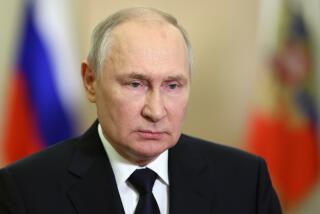Resonance in the Baltic
- Share via
In moves so harmonic they seemed orchestrated, the Soviet government admitted Thursday that the Baltic republics of Estonia, Latvia and Lithuania were illegally stripped of their sovereignty in 1939, and the Soviet Parliament decided to give some of it back. These developments promise a brighter future for these republics, the Soviet Union as a whole and for U.S.-Soviet relations.
In 1939, dictators Josef Stalin and Adolf Hitler made an agreement that essentially gave a green light to the Soviet Union’s forced annexation of the independent countries the following year. The Soviets have consistently denied the very existence of the protocols, insisting that “progressive forces” within Estonia, Latvia and Lithuania asked that their republics be incorporated into the Union of Soviet Socialist Republics. This falsification of history has vexed Estonians, Latvians and Lithuanians ever since. Fifty years later, the record has finally been set straight.
But this was a historical vexation, not a contemporary one, so it is entirely fitting that the Soviet Parliament responded to a current grievance at the same time, giving preliminary approval to Estonian and Lithuanian economic autonomy. The Baltic republics, by far the most prosperous of the Soviet Union’s regions, have long felt that their economic know-how was being exploited by less-prosperous regions. They have been forced to conform to economic dictates from Moscow, often at the expense of their local interests. The proposals for economic autonomy, which still need to be worked out in detail, will both harness the full economic potential of the the region and grant the republics a measure of control over their own affairs that is historically justified and long overdue.
Economic autonomy for the republics will benefit the Soviet Union as a whole. Leonid I. Abalkin, a Soviet deputy prime minister, told the Supreme Soviet Thursday that autonomy should be introduced in the Baltic republics as an initial step toward achieving an entirely new, decentralized system of economic management for the entire country, a system that should be far more efficient and responsive than the Moscow-dictated production quotas currently in place. Finally, the moves are beneficial to the United States, soothing old irritations in U.S.-Soviet relations.
Once again, in a pattern that would be monotonous if it were not exhilarating, Gorbachev has taken a revolutionary step in his campaign of liberalization, one that was inconceivable just a few months ago. Rarely do historical wrongs and contemporary rights converge with such resonance.
More to Read
Sign up for Essential California
The most important California stories and recommendations in your inbox every morning.
You may occasionally receive promotional content from the Los Angeles Times.













